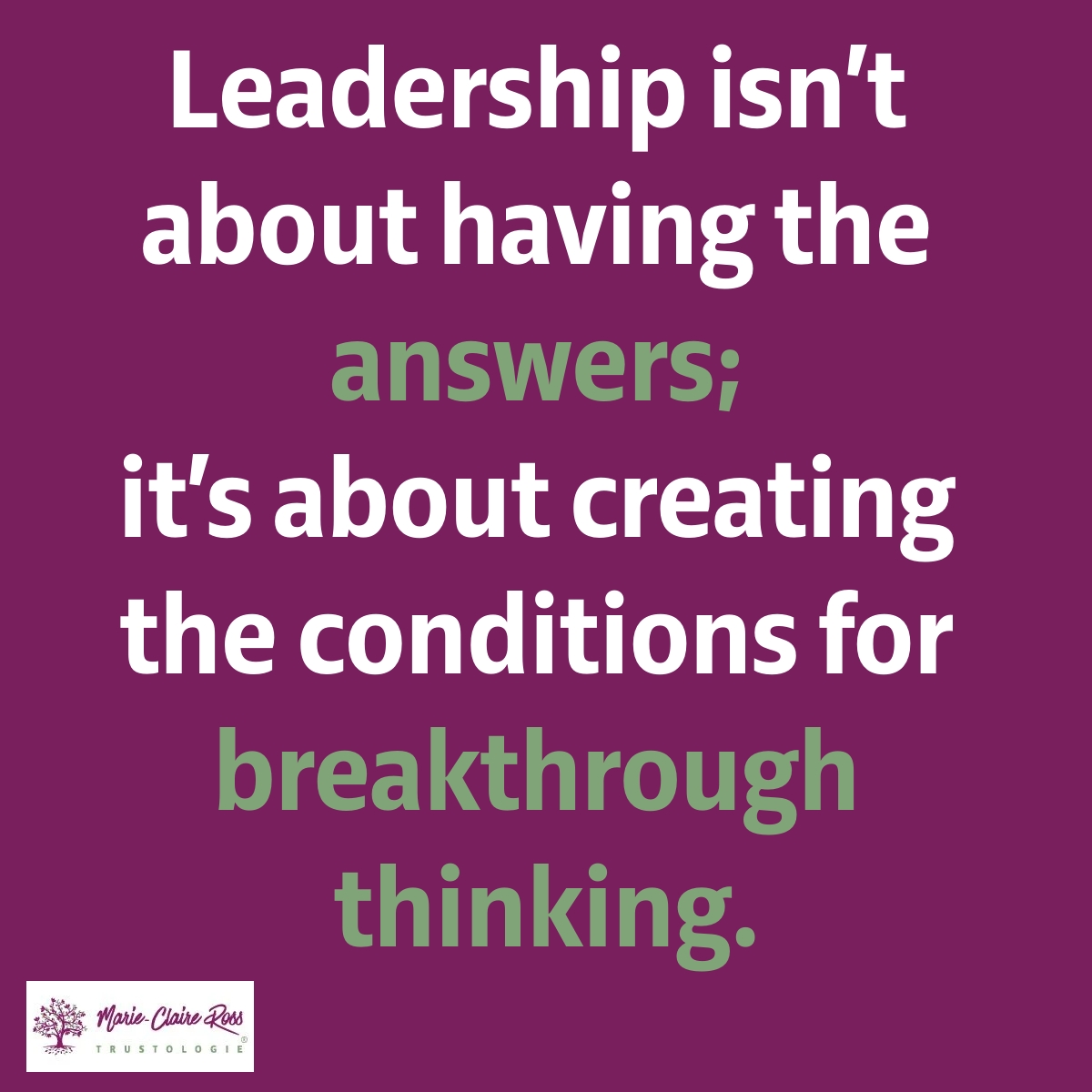8 min read
Beyond the "Why": 5 Coaching Secrets to Unlock Curiosity in Leadership
When my daughter was 17 months old, she discovered a superpower: the word “Why?”For the next two years, it was her response to almost everything.
Develop leaders, strengthen executive teams and gain deep insights with assessments designed to accelerate trust and performance.

Transform how your leaders think and perform with keynotes that spark connection, trust and high-performance cultures.

Explore practical tools, thought-leadership and resources to help you build trusted, high-performing teams.

Trustologie® is a leadership development consultancy founded by Marie-Claire Ross, specialising in helping executives and managers build high-trust, high-performing teams.


For over a year, I’ve been running monthly executive roundtables with CEOs, entrepreneurs and executives. On a couple of occasions I’ve had two senior leaders wax lyrical about their corporate culture.
Interestingly, these leaders proudly provided a lot of detail about their amazing workplaces. Comments such as these were enthusiastically thrown about: “We give everyone free dry-cleaning!” and “We close the office and spend half a day to do value-based activities as a team” and “We pretend we are Superman and Wonder Woman” and “We always talk about our values, everyone knows them.”
Of course, when you dig a little deeper you soon realise they are living in a deluded fairy land. When you ask the simple question “What are your values?” and get the reply “Oh, I can’t remember them right now, but I’ll go back to the office and email them to you.” You can almost hear the clunk of the other attendees’ thoughts whirring to a stop in their head, as they start to re-process the potential legitimacy of the forceful rant (and it’s always highly commanding, it’s common that other attendees have been cut off mid-sentence to hear the amazing workings of this attendee’s company).
But life has a funny way of showing where companies are getting it glaringly wrong. One of the organisations just happened to be an accountancy firm that I’ve used for over ten years. They’ve grown a lot in that time and are now a mid-tier firm. We’ve stuck with them because we valued the relationship with our accountant, even when they regularly made mistakes (because lord knows, most accountancy firms do) and when a partner of the business fell asleep in one of our annual meetings (and snored!).
So it was interesting to have a representative from this firm at my roundtable boasting about their fantastic culture while their company was in the process of completing our company tax returns (they were quite late with them). As luck would have it, a week later, I was faced with my draft financials showing a glaringly obvious error that I found in ten seconds. What looked like us receiving a healthy tax refund is now the opposite scenario. I’ve gone from “Hello Club Med!” to “Oh gee, how much do you think I can get if I sell my Bros record collection including signed Levi 501’s.” Of course, my accountant is not returning my calls or emails and I have no idea what’s going on. While I suffer from the good old 3am wake up calls drenched in sweat because I potentially owe the tax office money. If only superman would save me from my vomit-inducing fear of loss.
So as a client, what do you think I’m thinking?
Well, let me start with what I’m not thinking. And that is “Wow! I’m so glad they have an awesome culture!”
Instead, my thoughts include a lot of swear words and are more along the lines of “Well, perhaps if they weren’t having so much fun at work, giving out free Easter baskets, playing paintball and dressing up in lycra, they would have done a better job. It seems like their $380 per hour rate goes towards employees having a blast at work, while forgetting to care for the customer.”
We all know a gold star culture is one where everyone is accepted for who they are, where people love doing their work and understand how their work makes an impact in the world. They pull together as a team and give customers a great experience.
But this is meaningless if you forget about your customers. A culture must match the needs of your clients and your competitive advantage going forward. It’s not so much about you, and how awesome you are, but who you are as a group and how that provides the right service to customers. It’s customer-centric, not employee-centric. It’s about building trust within your customer service capabilities and having employees who know how to meet customer expectations and know how to apologise when things go astray.
Now, don’t get me wrong. Highly engaged employees do link to higher customer satisfaction and profits. Numerous studies highlight a positive association. As Brad Powers stated in a recent Harvard Business Review Article, it’s important to remember what comes between the motivated employee and the satisfied customer: the product or service that the employee creates and the company sells. This is where leaders get it wrong when they focus on keeping employees happy, but forget about how that translates into keeping customers happy.
I really don’t give a flying fig about my accountants prancing around the office all day in superhero costumes having fun. Call me old-fashioned, but I’d prefer them to be sitting alone in a small office, nerdily obsessed at getting my company tax returns right. If anything, I’d even rather they didn’t even talk to other people, if that meant I received the right advice and correct work done without being charged to fix their careless mistakes.
And maybe that’s where employees get confused about what culture means. That it’s about them having fun and being better than others.
When did having a great company culture become so damned competitive?
On the hand, business owners and CEOs have a more pragmatic approach to corporate culture. Interestingly, entrepreneurs that have been at my roundtables have been always been more cautious and thoughtful about describing their culture. They don’t talk about their culture been bigger, I mean better than their competitors. Really great CEOs and founders know that the work is never done. That it’s an ever-changing process that can change in an instant with one bad hire. And they never, ever boast about it (well, the good ones, anyway). Of course, they always look at the other side of it and how expensive it is to regularly provide employee engagement activities. After all, they’re the ones coughing up for all the superhero costumes and paintball outings.
Boasting about your company culture is a bit like oversharers on Facebook telling you too much about their love life. It feels awkward and phony. And that’s because it probably is.
A University of Toronto study found that people who put the most posts about their relationship tend to be more insecure about it. They’re actually suffering in their relationship and over-compensating by showing the world how great everything is.
Does that mean that over-sharers on their corporate culture just want to belong and are deluding themselves into believing that the company is great and that they are accepted for who they are? Perhaps.
So the next time someone tells you how awesome their culture is or tries to make you jealous by sharing all of the free perks they receive, don’t ask them to pass the vomit bag. Just smile. Remember, things aren’t always like they seem and that your friend just wants to belong and feel loved.
And if you’re a customer, start looking elsewhere for a new service provider. Because any employee who boasts about their great culture does not belong to a culture where exemplary customer service rules. Instead, what employees should be doing is boasting about the last time they helped a customer above and beyond what was expected.

8 min read
When my daughter was 17 months old, she discovered a superpower: the word “Why?”For the next two years, it was her response to almost everything.

11 min read
I have a friend who often finds herself at the mercy of her emotions. Recently, she called me to rehash a confrontation she’d had with a group of...

9 min read
True leadership presence isn’t a performance or a set of charisma hacks; it is the felt experience of who you are being in the room. By cultivating...

In the pressure cooker business world we live in, change and uncertainty have become commonplace. No longer can organisations rest on their laurels....

Corporate culture might be an over-used terms these days, but what it really boils down to is what behaviours staff undertake when no-one is watching.

Are your safety efforts are stuck in the past? Unfortunately, some companies think of safety as an afterthought ensuring that it is never fully...